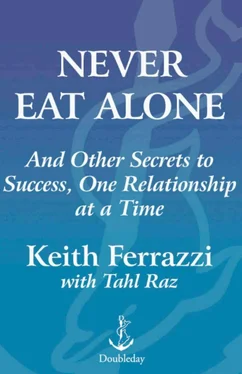Keith Ferrazzi - Never Eat Alone
Здесь есть возможность читать онлайн «Keith Ferrazzi - Never Eat Alone» весь текст электронной книги совершенно бесплатно (целиком полную версию без сокращений). В некоторых случаях можно слушать аудио, скачать через торрент в формате fb2 и присутствует краткое содержание. Год выпуска: 2005, ISBN: 2005, Издательство: C U R R E N C Y • D O U B L E D A Y, Жанр: marketing, на английском языке. Описание произведения, (предисловие) а так же отзывы посетителей доступны на портале библиотеки ЛибКат.
- Название:Never Eat Alone
- Автор:
- Издательство:C U R R E N C Y • D O U B L E D A Y
- Жанр:
- Год:2005
- ISBN:0-385-51529-4
- Рейтинг книги:4 / 5. Голосов: 1
-
Избранное:Добавить в избранное
- Отзывы:
-
Ваша оценка:
- 80
- 1
- 2
- 3
- 4
- 5
Never Eat Alone: краткое содержание, описание и аннотация
Предлагаем к чтению аннотацию, описание, краткое содержание или предисловие (зависит от того, что написал сам автор книги «Never Eat Alone»). Если вы не нашли необходимую информацию о книге — напишите в комментариях, мы постараемся отыскать её.
Never Eat Alone — читать онлайн бесплатно полную книгу (весь текст) целиком
Ниже представлен текст книги, разбитый по страницам. Система сохранения места последней прочитанной страницы, позволяет с удобством читать онлайн бесплатно книгу «Never Eat Alone», без необходимости каждый раз заново искать на чём Вы остановились. Поставьте закладку, и сможете в любой момент перейти на страницу, на которой закончили чтение.
Интервал:
Закладка:
There were two crucial components that made my mentorship with Pat—and makes any mentorship, for that matter—successful. He offered his guidance because, for one, I promised something in return. I worked nonstop in an effort to use the knowledge he was imparting to make him, and his firm, more successful. And two, we created a situation that went beyond utility. Pat liked me and became emotionally invested in my advancement. He cared about me. That's the key to a successful mentorship. A successful mentoring relationship needs equal parts utility and emotion. You can't simply ask somebody to be personally invested in you. There has to be some reciprocity involved—whether its hard work or loyalty that you give in return—that gets someone to invest in you in the first place. Then, when the process kicks in, you have to mold your mentor into a coach; someone for whom your success is in some small or big way his success. I owe so much to Pat. If it were not for him, I would not be the man I am today. And that goes for so many others, starting with my Mom and Dad and Jack Pidgeon from the Kiski School, and my "Uncle" Bob Wilson, to so so so many others I've mentioned in this book, as well as those left unmentioned but to whom I feel so close.
The best way to approach utility is to give help first, and not ask for it. If there is someone whose knowledge you need, find a way to be of use to that person. Consider their needs and how you can assist them. If you can't help them specifically, perhaps you can contribute to their charity, company, or community. You have to be prepared to give back to your mentors and have them know that from the outset. Before Pat would consider having dinner with me three times a year, he had to know that I would be committed to his firm. That's how I found myself so early on in a trusted position that later turned into a friendship.
If, however, there are no immediate opportunities to help, you must be prudent and conscious of the imposition you're placing on that person. Almost every day, some ambitious young man or woman sends me an e-mail that states all too directly, "I want a job." Or, "I think you can help me. Take me on as your mentee." I shudder at how deeply these young folks misunderstand the process. If they're going to get my help, and they haven't even offered their help in return, then at minimum they should attempt to endear themselves to me. Tell me why you're special. Tell me what we have in common. Express gratitude, excitement, and passion.
The problem is often that these people have never had mentors before and they have a limited view of how it works. Some people think there is just one special person out there waiting to be all things at all times to them. But as my father taught me, mentors are all around you. It's not necessarily your boss or even someone in your business. Mentoring is a nonhierarchical activity that transcends careers and can cross all organizational levels.
A CEO can learn from a manager, and vice versa. Some smart companies, recognizing this fact, actually have programs in place that view new hires as mentors to the company. After a month on the job, they'll ask these new employees to jot down all their impressions with the idea that a pair of fresh eyes can see old problems and make innovative suggestions that others can't.
In fact, the people I've learned so much from are my own young mentees, who help me periodically to update my skills and view the world anew.
As much as you stretch yourself by reaching up, be sure you are stretching just as far to reach back and help others. I've always taken the time to give young people a helping hand. Most of them actually end up working for me at some point, either as interns or employees. People like Paul Lussow, Chad Hodge, Hani Abisaid, Andy Bohn, Brinda Chugani, Anna Mongayt, John Lux, Jason Annis. The list goes on and on.
There are those who don't get it at first. They sheepishly ask, "How can I ever repay you for all that you are doing?" I tell them they're repaying me now. All I really expect is sincere gratitude, and to see them apply all that they are learning.
To see Brinda moving up at Deloitte, Hani becoming a partner in one of my businesses and "graduating" into a new company I had a hand in forming, Chad becoming one of Hollywood's most successful young writers, Andy becoming a player in Hollywood himself, or Paul attending Wharton is a total thrill. It's even more so when they get to a point in their careers when they start becoming mentors themselves.
I can't stress enough how powerful the process is and how important it is that you give your respect and time to it. In return, you'll be more than compensated with spirit, enthusiasm, trust, and empathy—all things that will ultimately far exceed the value of any advice you gave.
If you take mentoring seriously, and give it the time and energy it deserves, you'll soon find yourself involved in a learning network not unlike the one Intel uses. You'll be the recipient of more information and more goodwill than you ever imagined, as you play the role of both master and apprentice in a powerful constellation of people all simultaneously teaching and being taught.
If connecting can be described, loosely, as the commingling of friendship and mission, then First Lady Eleanor Roosevelt was one of the twentieth century's premier practitioners. In her autobiography, she wrote: being " d r a w n together through the work . . . is . . . one of the most satisfying ways of making and keeping friends." Through groups such as the International Congress of Working Women and the Women's International League of Peace and Freedom (WILPF), Roosevelt befriended a w i d e circle of friends—and a few foes—in advancing some of the great social causes of our time.
The First Lady was not timid about using her personal network to tackle testy social issues. For example, she fought for women's rights in the workplace—their inclusion in labor unions and their right to a living w a g e . Today, those seem like uncontroversial issues, but during the late 1 920s and early 1 9 3 0 s , many Americans blamed working women for displacing male "breadwinners" in the midst of the Great Depression.
Roosevelt believed the beauty and obligation of living in a democracy was to make a stand for what you believe in; and she proved you could do so while gaining the trust and admiration of your peers. She also proved that sometimes it was your peers whom you need to stand up against.
In 1 9 3 6 , thanks largely to the First Lady, an opera singer named M a r i a n Anderson became the first black person to perform at the White House. But Anderson's acceptance at 1 6 0 0 Pennsylvania Avenue was unusual. Though Anderson was the country's thirdhighest concert box-office draw, her success did not exempt her from the racial biases that pervaded her era. W h e n traveling, she was restricted to " c o l o r e d " waiting rooms, hotels, and train cars. In the South, newspapers rarely called her "Miss Anderson," opting for "Artist Anderson" and "Singer Anderson" instead.
In 1 9 3 9 , Anderson's manager and Howard University tried to arrange a performance at Constitution Hall in Washington, D.C. The Daughters of the American Revolution (D.A.R.), the organization that owned the Hall, refused them. Roosevelt, herself a member of the D.A.R., promptly—and publicly—resigned her membership to protest. In a letter to the D.A.R., she wrote: "/ am in complete disagreement with the attitude taken in refusing Constitution Hall to a great artist . . . You had an opportunity to lead in an enlightened way and it seems to me that your organization has failed."
Читать дальшеИнтервал:
Закладка:
Похожие книги на «Never Eat Alone»
Представляем Вашему вниманию похожие книги на «Never Eat Alone» списком для выбора. Мы отобрали схожую по названию и смыслу литературу в надежде предоставить читателям больше вариантов отыскать новые, интересные, ещё непрочитанные произведения.
Обсуждение, отзывы о книге «Never Eat Alone» и просто собственные мнения читателей. Оставьте ваши комментарии, напишите, что Вы думаете о произведении, его смысле или главных героях. Укажите что конкретно понравилось, а что нет, и почему Вы так считаете.












